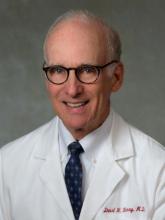Edward S. Kim, MD, of Levine Cancer Institute at Atrium Health in Charlotte, N.C., chats with David H. Henry, MD, host of Blood & Cancer, about how to perform clinical trials in the community oncology setting.
Plus, in Clinical Correlation, Ilana Yurkiewicz, MD, of Stanford (Calif.) University, discusses a byproduct of our fragmented health care system – patients having to hear the same bad news repeated over and over.
Show notes
- Only 3%-4% of adult oncology patients are enrolled in clinical trials.
- Most patients diagnosed with cancer are seen in community settings (as opposed to academic centers).
- Oncologists in the community setting face significant obstacles to enrolling their patients in clinical trials:
- Communication between academic and community centers often is lacking, especially in more rural areas of the country.
- Community-based oncologists usually are not compensated for time spent on research or academic work.
- Treatment pathways used by many oncologists may not offer any information regarding clinical trials.
- The traditional infrastructure of a community practice may not have the necessary experts to facilitate clinical trial participation.
- Community oncologists may not feel comfortable talking to their patients about a novel drug of which they have little knowledge.
- How can community oncologists facilitate participation in clinical trials?
- There must be a cultural change, starting with the organization’s leadership.
- A study coordinator is crucial.
- Data, finance, and regulatory individuals are likely required.
- Coordination with pharmacy and pathology usually is necessary.
- Electronically Accessible Pathways (EAPathways) is a tool developed by Dr. Kim’s team. It is available and allows any oncologist to input a patient’s information to determine if there is an appropriate clinical trial available.
Show notes by Sugandha Landy, MD, a resident in the department of internal medicine, University of Pennsylvania, Philadelphia
Dr. Kim can be reached at Edward.Kim@atriumhealth.org
Additional reading
Patronik KE and ES Kim. A novel clinical pathways approach to delivering regional-based clinical trials and patient care in a hybrid academic- community-based system. J Clin Pathways. 2018 May;4(4):52-5.
Ersek JL et al. Implementing precision medicine programs and clinical trials in the community-based oncology practice: Barriers and best practices. Am Soc Clin Oncol Educ Book. 2018 May 23:38:188-96.
For more MDedge Podcasts, go to mdedge.com/podcasts
Email the show: podcasts@mdedge.com
Interact with us on Twitter: @MDedgehemonc
David Henry on Twitter: @davidhenrymd
Ilana Yurkiewicz on Twitter: @ilanayurkiewicz

